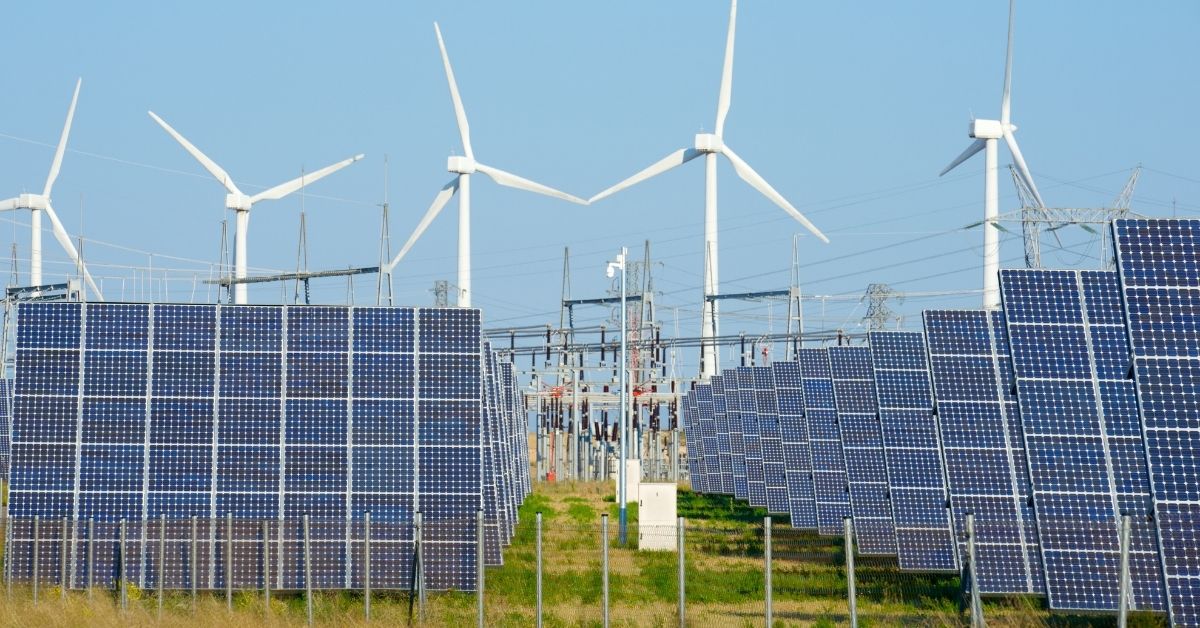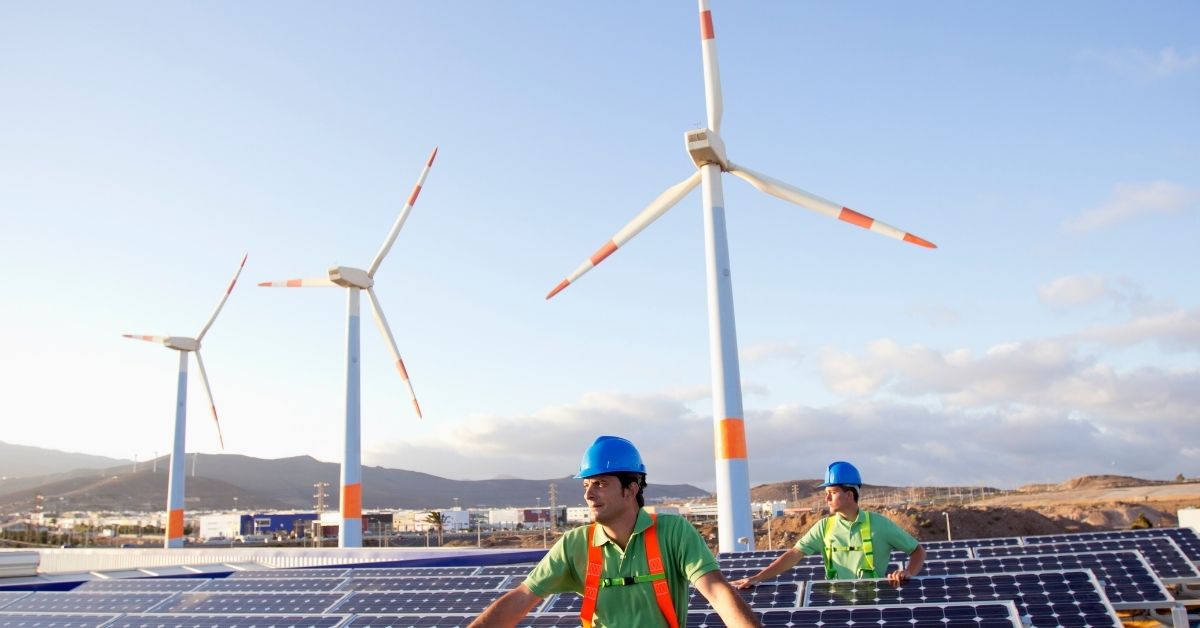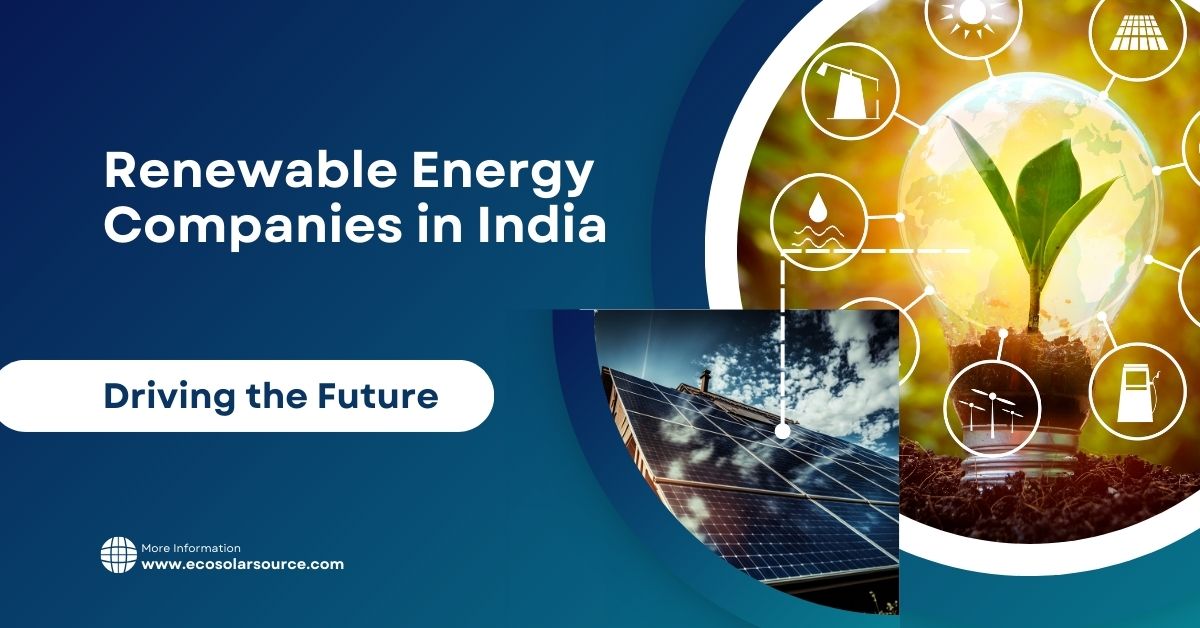Renewable Energy Companies in India
Renewable energy companies in India are driving the nation’s transition toward a sustainable future by harnessing clean power sources like solar, wind, hydropower, and biomass. These companies play a critical role in reducing carbon emissions, ensuring energy security, and promoting eco-friendly growth.
With government incentives, private investments, and a focus on innovation, these firms are deploying advanced technologies to generate affordable and reliable green energy. They contribute to India’s ambitious goals under the Paris Agreement and are vital in achieving the nation’s target of 500 GW of renewable energy capacity by 2030, fostering a cleaner environment and sustainable development.
Table of Contents
Renewable Energy Companies in India: Pioneers in Clean Energy Revolution
India, with its growing population and industrial expansion, faces an ever-increasing demand for energy. Historically, the country has relied heavily on coal and other fossil fuels to meet this need. However, the environmental consequences of such reliance have become glaringly evident, resulting in an urgent shift toward cleaner energy solutions. Renewable energy sources, such as solar, wind, hydropower, and biomass, have emerged as critical alternatives to traditional energy sources. Today, India stands as one of the leading countries in renewable energy adoption, and a significant part of this success is owed to several renewable energy companies that have played pivotal roles in driving this revolution.

This article will delve into the key renewable energy companies in India, their contributions to the clean energy movement, their projects, and their role in helping India meet its renewable energy targets.
Tata Power Renewable Energy Limited (TPREL)
Overview: Tata Power Renewable Energy Limited, a subsidiary of Tata Power, is one of the largest renewable energy companies in India. It focuses on solar, wind, and hydroelectric energy production. Tata Power’s commitment to clean energy is evident through its ambitious projects and sustainable practices.
Key Projects:
- Solar Power Initiatives: Tata Power has set up numerous solar power plants across India, with a significant portion of its renewable energy portfolio comprising solar power. Its large solar project in Pavagada, Karnataka, is one of the largest solar parks in India.
- Wind Energy: TPREL has invested significantly in wind energy production, with projects spread across the states of Gujarat, Maharashtra, Tamil Nadu, and Rajasthan.
Impact: Tata Power has consistently expanded its renewable energy capacity, aiming to achieve a 100% clean energy portfolio in the coming decades. The company’s commitment to sustainability is evident in its efforts to reduce carbon emissions while providing reliable energy solutions.
Adani Green Energy Limited (AGEL)
Overview: Adani Green Energy Limited (AGEL), a part of the Adani Group, has rapidly emerged as one of India’s largest renewable energy companies. With a focus on solar and wind energy, AGEL has taken the lead in scaling up India’s renewable energy capacity to meet growing demands.
Key Projects:
- Solar Parks: AGEL operates some of the largest solar parks in India, including the 648 MW solar power plant in Tamil Nadu. The company is also developing the world’s largest solar-wind hybrid park in Gujarat.
- Wind Power: AGEL has been investing heavily in wind energy projects, with numerous wind farms in Gujarat, Karnataka, and Andhra Pradesh.
Impact: AGEL has set ambitious goals to reach a renewable energy capacity of 45 GW by 2030, contributing significantly to India’s goal of achieving 450 GW of renewable energy capacity by the same year. Its focus on innovation and large-scale projects positions it as a key player in India’s green energy future.
ReNew Power
Overview: ReNew Power is one of India’s largest renewable energy companies and is particularly notable for its leadership in both solar and wind energy sectors. The company has been a pioneer in large-scale renewable energy projects and aims to make a significant contribution to India’s clean energy transition.
Key Projects:
- Solar and Wind Power Projects: ReNew Power owns and operates several large solar and wind farms across India. One of its flagship projects is the 300 MW wind farm in Gujarat. The company is also focusing on solar power with several projects spread across Rajasthan, Madhya Pradesh, and Karnataka.
- Energy Storage Solutions: ReNew Power is also looking into integrating energy storage with renewable energy to ensure grid stability and improve the reliability of solar and wind power generation.
Impact: ReNew Power’s focus on scaling up renewable energy infrastructure has made it one of the top contributors to India’s renewable energy goals. The company’s efforts in energy storage are crucial as India seeks to balance intermittent renewable sources with consistent power supply.
Suzlon Energy
Overview: Suzlon Energy, one of India’s oldest renewable energy companies, specializes in wind energy solutions. The company designs, manufactures, and installs wind turbines, with operations spanning across India and global markets. It has been instrumental in establishing India as a key player in the global wind energy market.
Key Projects:
- Wind Energy Projects: Suzlon has installed over 18 GW of wind energy capacity across India, making it a major player in the wind energy sector. The company has focused on wind farms in states such as Gujarat, Tamil Nadu, Maharashtra, and Rajasthan.
- Global Presence: While Suzlon has a strong presence in India, it also operates globally, with significant projects in the U.S., Europe, and other parts of Asia.
Impact: Suzlon’s pioneering efforts in wind energy have helped India become one of the top five countries in the world in terms of installed wind energy capacity. The company’s innovations in turbine design and manufacturing continue to push the boundaries of what is possible in the renewable energy sector.
NHPC Limited (National Hydroelectric Power Corporation)
Overview: While solar and wind energy often dominate the conversation around renewable energy, hydropower remains a critical component of India’s clean energy mix. NHPC Limited, a government-owned corporation, is the largest hydropower company in India and plays a crucial role in providing stable, renewable energy.
Key Projects:
- Hydropower Projects: NHPC operates 24 hydropower stations across India, with a total installed capacity of over 7 GW. Some of its notable projects include the Teesta-V hydroelectric plant in Sikkim and the Subansiri Lower project in Assam and Arunachal Pradesh.
- Solar Ventures: In recent years, NHPC has also ventured into the solar energy sector, with plans to develop large-scale solar parks in several states.
Impact: Hydropower remains one of the most reliable sources of renewable energy, providing consistent power output compared to intermittent sources like solar and wind. NHPC’s role in balancing India’s energy grid while reducing carbon emissions is indispensable.
Azure Power
Overview: Azure Power is a leader in the solar energy sector and has contributed significantly to India’s push for large-scale solar energy adoption. The company focuses on the development, construction, and operation of utility-scale solar projects and is known for its innovative approach to solar power generation.
Key Projects:
- Solar Power Plants: Azure Power has developed several large solar power plants, including a 600 MW plant in Rajasthan and a 500 MW plant in Uttar Pradesh. The company is also expanding its footprint in other states like Gujarat and Madhya Pradesh.
- Off-Grid Solutions: Azure Power has been working on off-grid solar solutions, which are crucial for providing energy to remote areas that lack access to the traditional power grid.
Impact: Azure Power’s efforts to scale up solar energy capacity have positioned it as a leading player in India’s renewable energy landscape. The company’s focus on innovation, sustainability, and off-grid solutions aligns with India’s broader goals of increasing energy access and reducing carbon emissions.
Sterling and Wilson Solar Limited
Overview: Sterling and Wilson Solar Limited, part of the Shapoorji Pallonji Group, is one of India’s leading solar EPC (Engineering, Procurement, and Construction) companies. It has a significant presence not only in India but also globally, with projects in countries such as Egypt, South Africa, and the United States.
Key Projects:
- EPC Services for Solar Plants: Sterling and Wilson has provided EPC services for some of the largest solar power plants in India, including projects in Rajasthan, Gujarat, and Tamil Nadu. The company’s expertise in project management and execution has made it a preferred partner for large-scale solar developers.
- Global Solar Projects: In addition to its domestic projects, Sterling and Wilson has built solar plants in countries such as Australia, Vietnam, and Zambia, highlighting its global reach and expertise.
Impact: Sterling and Wilson Solar’s role in providing EPC services for some of the world’s largest solar power plants has solidified its position as a key enabler of the global renewable energy transition. Its expertise and execution capabilities contribute significantly to India’s solar energy capacity expansion.
NTPC Renewable Energy Ltd (NTPC REL)
Overview: NTPC, India’s largest power utility, has made significant strides in the renewable energy sector through its subsidiary, NTPC Renewable Energy Limited (NTPC REL). With a strong focus on solar, wind, and hybrid energy solutions, NTPC is aiming to be one of the largest clean energy providers in India.
Key Projects:
- Solar and Wind Energy Projects: NTPC has commissioned several solar and wind energy projects, with plans to expand its renewable energy capacity to 60 GW by 2032. Its projects include a 250 MW solar power plant in Ananthapuramu, Andhra Pradesh, and a 150 MW wind farm in Gujarat.
- Floating Solar Power: NTPC is pioneering floating solar projects, with its 100 MW floating solar plant at Ramagundam in Telangana being one of the largest in India. This innovative approach helps optimize land use and reduce the environmental impact of solar power plants.
Impact: NTPC’s focus on scaling up renewable energy capacity while integrating innovative solutions like floating solar power makes it a key player in India’s renewable energy transition. The company’s ambitious targets are in line with India’s broader goal of achieving energy security through sustainable means.
Indian Renewable Energy Development Agency (IREDA)
Overview: Although not a direct energy producer, the Indian Renewable Energy Development Agency (IREDA) plays a crucial role in financing and promoting renewable energy projects across India. IREDA is a government-owned financial institution that provides loans and other financial assistance to renewable energy developers.
Key Projects and Initiatives:
- Financing Renewable Energy Projects: IREDA has financed thousands of renewable energy projects across India, providing the necessary capital for developers to scale up solar, wind, and biomass energy projects.
- Promoting Energy Efficiency: In addition to financing renewable energy, IREDA also promotes energy efficiency projects, helping industries reduce their carbon footprint.
Impact: IREDA’s role in financing renewable energy projects has been instrumental in helping India achieve its renewable energy targets. By providing financial support to developers, the agency has helped scale up the deployment of clean energy solutions across the country.
Hero Future Energies
Overview: Hero Future Energies (HFE) is a part of the Hero Group and has emerged as a leading renewable energy company in India. With a focus on solar, wind, and hybrid projects, HFE is committed to contributing to India’s clean energy transition.
Key Projects:
- Wind and Solar Projects: HFE operates several large wind and solar projects across India, including a 100 MW solar power plant in Rajasthan and a 50 MW wind farm in Karnataka.
- Hybrid Projects: HFE is also exploring the potential of hybrid energy projects that combine wind and solar energy to provide more reliable and efficient power generation.
Impact: Hero Future Energies’ focus on hybrid energy solutions is particularly significant as India looks to integrate different renewable energy sources to provide consistent power supply. HFE’s efforts are aligned with India’s broader goals of achieving a sustainable and diversified energy mix.
The Road Ahead for Renewable Energy in India
India has set ambitious renewable energy targets, aiming to achieve 450 GW of renewable energy capacity by 2030. The government has also introduced several policies and initiatives to support this transition, such as the National Solar Mission, wind energy auctions, and incentives for electric vehicles.

The contribution of renewable energy companies in India cannot be understated. Companies like Tata Power, Adani Green Energy, ReNew Power, and others are playing a vital role in transforming the energy landscape of the country. Their efforts are helping India not only meet its growing energy needs but also reduce its carbon emissions and move towards a more sustainable future.
As renewable energy technologies continue to advance and costs decline, India’s renewable energy sector is poised for further growth. The active involvement of both public and private players in this space, along with government support, ensures that India remains on track to become a global leader in renewable energy.
Advantages and Disadvantages of Renewable Energy Companies in India
India is emerging as a global leader in renewable energy, with ambitious targets to reduce carbon emissions and promote sustainable growth. The rise of renewable energy companies in the country plays a pivotal role in shaping India’s clean energy future. However, like any other sector, this industry presents its own set of advantages and challenges. Let’s explore the pros and cons of renewable energy companies operating in India.
Advantages of Renewable Energy Companies in India
- Environmental Benefits
Renewable energy companies contribute significantly to reducing India’s carbon footprint. Solar, wind, and hydroelectric power offer cleaner alternatives to traditional fossil fuels, reducing air pollution and greenhouse gas emissions. This helps combat climate change while promoting environmental sustainability. - Energy Independence
Renewable energy reduces India’s reliance on imported fossil fuels like coal and oil. By harnessing natural resources such as sunlight and wind, the country can achieve greater energy security and reduce energy import costs, benefiting the overall economy. - Job Creation
The renewable energy sector has immense potential to generate employment opportunities. From manufacturing solar panels to maintaining wind turbines, companies in this sector are creating jobs across various skill levels, especially in rural areas, where such projects are often established. - Scalability and Sustainability
Renewable energy sources are virtually inexhaustible, providing a long-term, sustainable solution to meet India’s growing energy demand. As renewable energy companies continue to innovate, the potential to scale and diversify across multiple regions enhances energy access and equity. - Government Support and Incentives
The Indian government has launched numerous schemes and policies, such as the National Solar Mission and financial incentives for renewable energy projects, making it easier for companies to operate and invest in the sector. This favorable policy environment encourages more companies to enter the renewable energy space.

Disadvantages of Renewable Energy Companies in India
- High Initial Investment
One of the primary challenges renewable energy companies face is the high upfront cost of technology and infrastructure. Solar panels, wind turbines, and grid integration require significant capital investment, which can be a barrier for small or emerging players in the market. - Intermittency and Reliability Issues
Renewable energy sources like solar and wind are dependent on weather conditions, which can be unpredictable. This intermittency can lead to fluctuations in energy production, making it less reliable compared to conventional power sources like coal and natural gas. Energy storage technology is still evolving, and until it becomes more affordable, this remains a critical challenge. - Land and Resource Use Conflicts
Renewable energy projects, particularly solar farms and wind turbines, require vast amounts of land. In a country like India, where land resources are often scarce and contested, this can lead to conflicts with local communities, agriculture, and other land-use priorities. - Limited Energy Storage Solutions
While renewable energy generation is growing rapidly, the challenge of storing this energy efficiently remains a hurdle. Batteries and other energy storage technologies are expensive and not yet widely available, limiting the ability to store excess power for later use. - Grid Integration and Infrastructure Challenges
India’s existing power grid is not fully optimized to handle the integration of renewable energy at scale. Companies face technical challenges in balancing the grid and ensuring smooth distribution of power, especially in rural or remote areas. Upgrading infrastructure to support renewable energy requires substantial investment and coordination with government bodies.
FAQs About Renewable Energy Companies in India
Q1. What types of renewable energy sources are commonly utilized by companies in India?
Renewable energy companies in India primarily focus on solar, wind, hydro, and biomass energy. Solar energy is the most widespread, given India’s high solar potential, followed by wind energy in coastal and windy regions.
Q2. Who are the leading renewable energy companies in India?
Some of the top renewable energy companies in India include Tata Power Renewable Energy, Adani Green Energy, ReNew Power, Suzlon Energy, and Greenko Group. These companies lead in solar, wind, and hybrid energy projects.
Q3. How does the Indian government support renewable energy companies?
The Indian government provides various subsidies, tax incentives, and policies like feed-in tariffs, Accelerated Depreciation (AD), and Viability Gap Funding (VGF) to promote renewable energy development. Additionally, initiatives like the National Solar Mission and Green Energy Corridors enhance infrastructure and grid connectivity.
Q4. What challenges do renewable energy companies in India face?
Challenges include inconsistent policy support across states, land acquisition issues, grid connectivity, fluctuating power tariffs, and intermittency of renewable sources. Additionally, funding and access to affordable financing can be hurdles for smaller firms.
Q5. How do renewable energy companies contribute to India’s climate goals?
Renewable energy companies play a crucial role in achieving India’s target of 500 GW of non-fossil fuel-based power by 2030 and reducing emissions intensity by 45%. Their projects help transition from coal-based energy to cleaner alternatives, reducing carbon emissions.
Q6. What is the potential for job creation in the renewable energy sector in India?
The renewable energy sector is a major job creator in India. Solar and wind projects, manufacturing of equipment like solar panels and wind turbines, and installation and maintenance of plants contribute to both direct and indirect employment opportunities.
Q7. How do renewable energy companies integrate technology and innovation in their projects?
Companies are adopting innovative technologies such as AI for predictive maintenance, IoT for energy management, and battery storage solutions to improve efficiency. Hybrid projects combining solar and wind or integrating with storage systems are also gaining traction.
Q8. What is the role of foreign investments in India’s renewable energy sector?
Foreign Direct Investment (FDI) is a key driver in the renewable energy space, with major investments from international firms like TotalEnergies, SoftBank, and BlackRock. Favorable policies and large-scale projects have made India an attractive destination for renewable energy investments.
Q9. How do renewable energy companies in India manage the intermittency of solar and wind energy?
To manage the intermittent nature of solar and wind energy, companies are investing in energy storage technologies, including battery storage systems. They also utilize grid balancing mechanisms and hybrid plants that combine solar and wind for more consistent power output.
Q10. What is the future outlook for renewable energy companies in India?
The future looks promising with increasing government initiatives, international commitments like the Paris Agreement, and growing domestic demand for clean energy. The sector is expected to grow rapidly, driven by technological advancements, declining costs of solar and wind power, and increasing private sector involvement.
Renewable energy companies in India are not just contributing to the country’s energy security but also to global efforts in combating climate change. Their innovative projects, sustainable practices, and ambitious targets are driving the clean energy revolution in India, paving the way for a greener and more sustainable future.
Click here to learn more about Renewable Energy Companies in India
Click here to learn more about Wind Energy Companies in India

